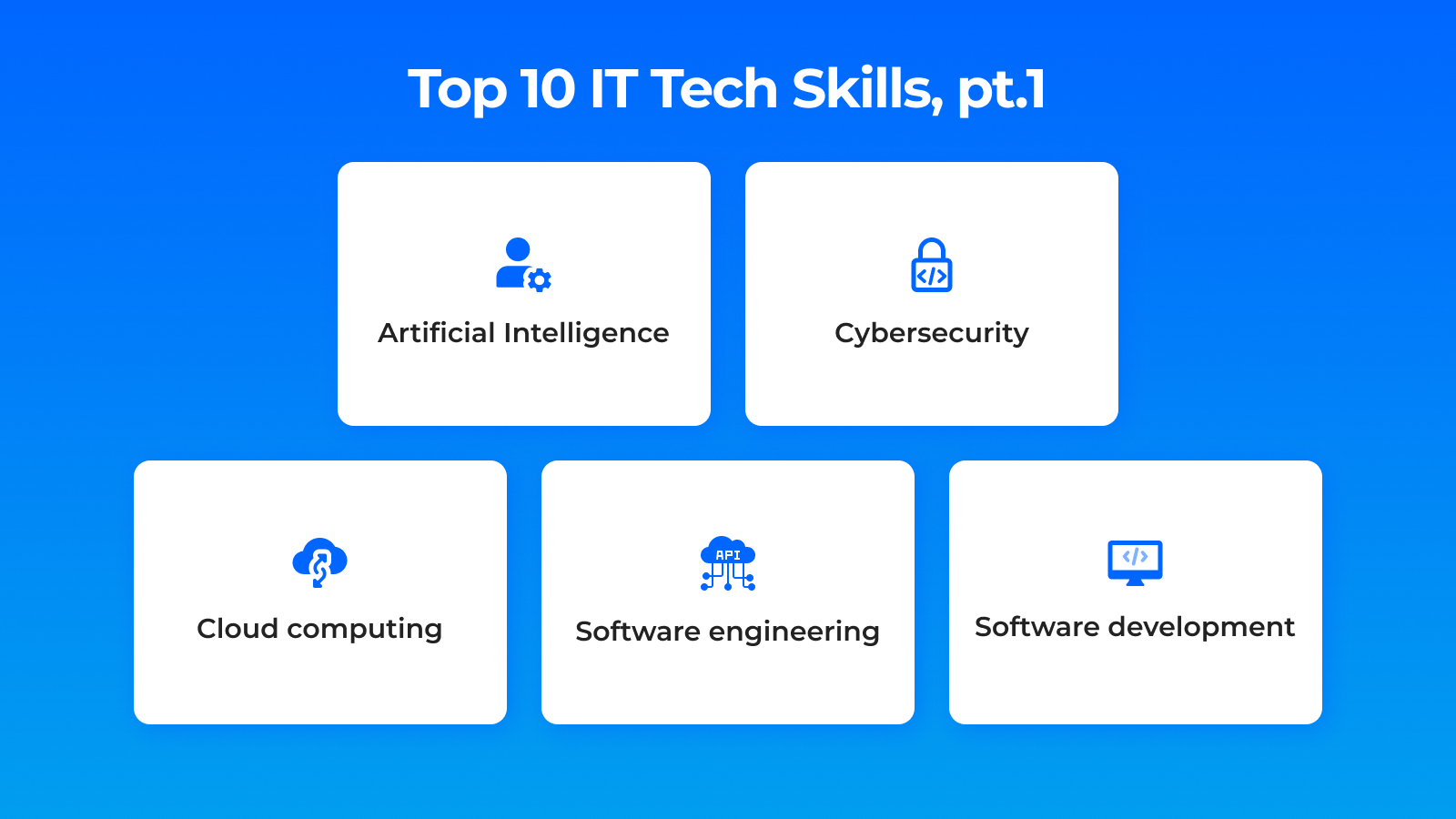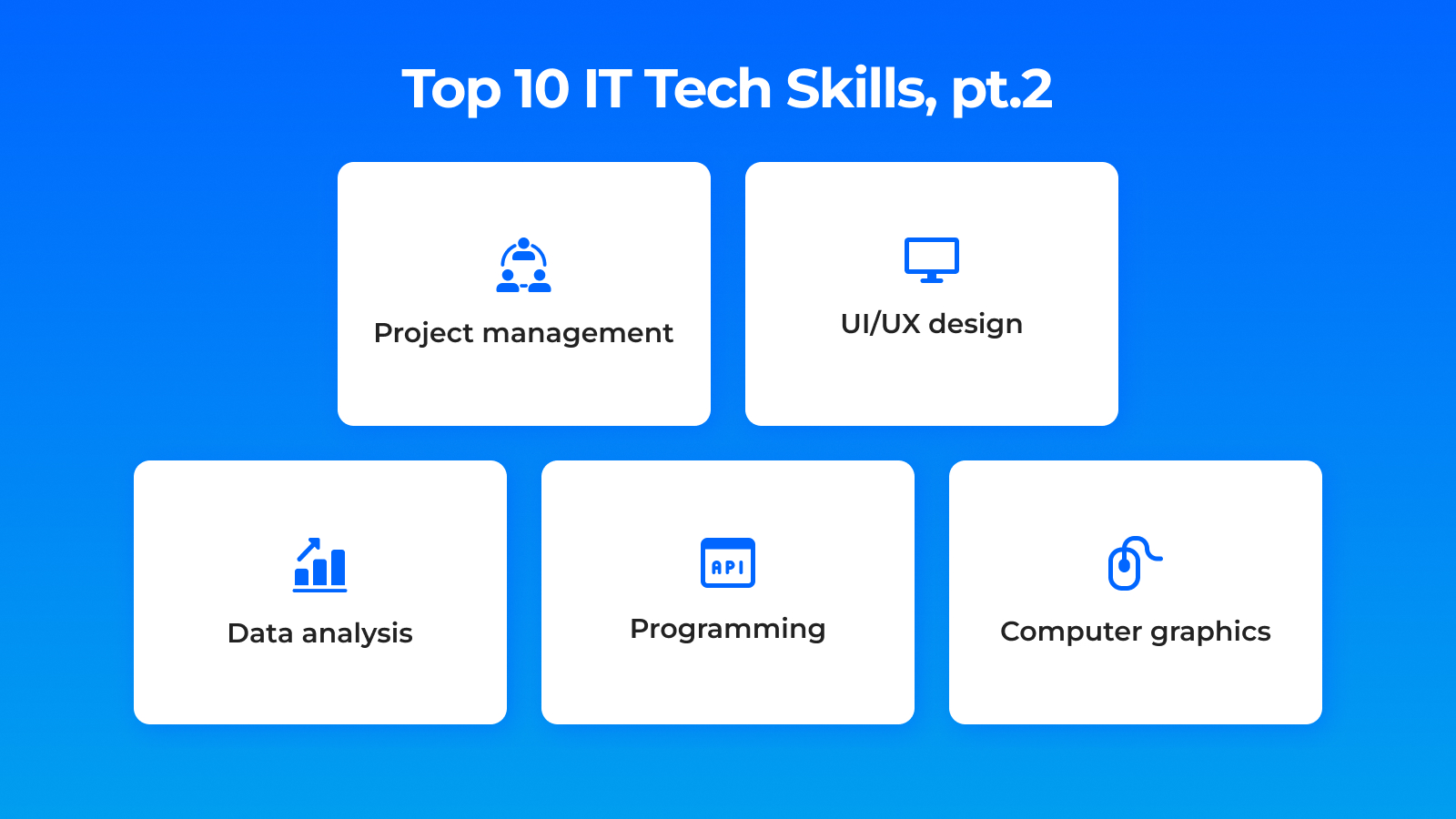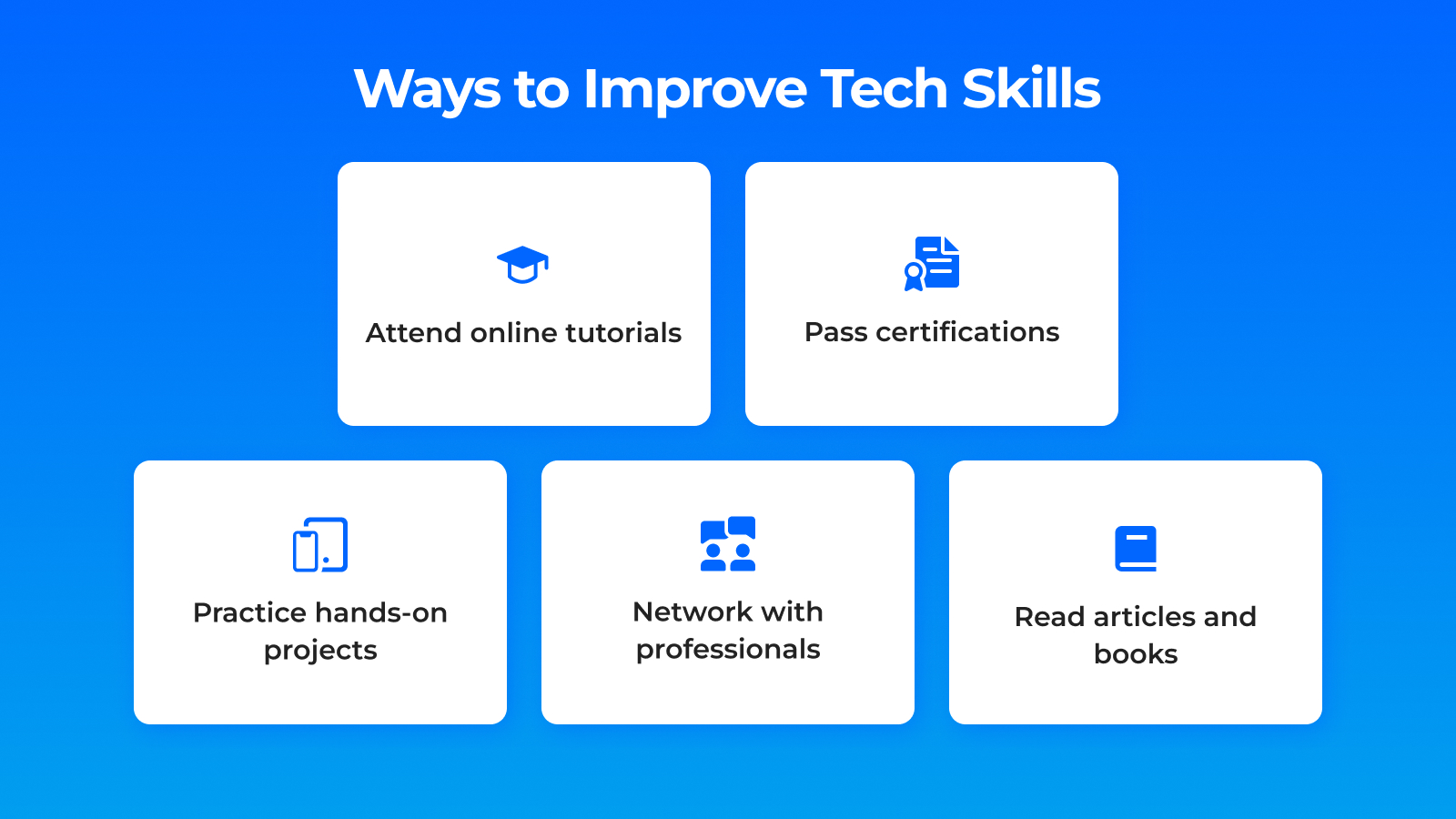Today’s world of technology is continuously changing and developing, opening up new opportunities. Having the right skills is essential to stay competitive in the job market. With the right IT skills, you can demonstrate your abilities to employers and stand out from other job seekers. This article examines today’s ten most in-demand IT skills, highlighting why each is meaningful and how to acquire them. Read on to discover what IT skills you need to stay ahead of the competition.
The Essence of IT Skills
Technology skills are the experience or knowledge required to perform various tasks. They range from basic computer literacy, such as typing and spreadsheet skills, to more complex concepts, such as creating software and managing digital information. IT skills are among the hard skills that require formal training, on-the-job experience, or focused study. In many cases, job applicants or employees are required to have a high level of IT skills to perform their duties effectively and accurately.
Organizations now recognize that these competencies are vital to their success in the digital era, where data sharing, client interaction through social media platforms, and remote collaboration are daily tasks that can only be completed with access to technology. Businesses in all sectors must equip their staff with technical skills to remain competitive and keep up with trends in their industry; failure to do so can threaten innovation and ultimately lead to slow growth or even stagnation of a business. By developing technology aptitude among its employees from entry-level positions up to executive management, a company can expect an increase in productivity and overall efficiency.
The List of Most Demanded Tech Skills
In today’s competitive market, a wide range of IT skills is essential to success in a technology-driven workplace. From software development to artificial intelligence, a wide variety of technology experiences are necessary for the digital transformation of businesses, and each of these skills is highly valued. In this list, we look at some of the most popular and in-demand tech skills today.

1. Artificial Intelligence (AI)
Artificial Intelligence (AI) is an exciting concept that can revolutionize many industries. AI involves creating computer systems that can self-learn and make decisions on their own by mimicking some of the basic processes of human intelligence, such as learning from experience, solving troubles, understanding words, and responding with language. Modern AI can also recognize particular objects and make decisions based on available information.
2. Cybersecurity
In parallel with the development of computer technology, there are more and more cyber threats related to data contained in the cloud, on servers, etc. In this regard, cybersecurity is one of the leading trends in the IT industry. As more and more organizations rely on digital technology, it has become increasingly critical for companies to protect their assets from cyberattacks, data breaches, and other malicious activities. Cybersecurity professionals are responsible for developing and implementing strategies to keep company systems, networks, data, and information safe from unauthorized access or manipulation by third parties.
3. Cloud computing
Cloud computing has been gaining popularity over the years, and it’s no surprise why. It allows companies to keep their data secure, save money on infrastructure costs, and scale as needed. Cloud technology also offers developers and administrators plenty of career opportunities that involve building cloud infrastructure, maintaining cloud systems, or creating apps in the cloud environment.
The most popular cloud platforms right now are Amazon Web Services (AWS), Microsoft Azure, Oracle Cloud Infrastructure (OCI), and Google Cloud Platform (GCP). You will need detailed knowledge and experience with at least one of these providers to stand out in the market for these positions. In addition, certain areas of specialization can make a person more attractive as a job candidate – data center migration to the cloud, fault tolerance development for servers using different physical locations, and background in highly automated server administration tools such as Kubernetes solutions can be examples of specific specializations that employers are searching for.
4. Software engineering
Software engineers design and build software programs and applications to meet the company’s needs. Working with the software development team, they must be able to communicate and collaborate confidently to ensure projects progress successfully. As part of their job, they produce quality source code that is well-documented and organized while working closely with the team’s quality assurance staff to guarantee the correct execution of all tests before a product launch.
A bachelor’s degree in computer science, electrical engineering, computer engineering, or other related discipline may be required to pursue a career as a software engineer. It is also beneficial for prospective engineers to have experience with widespread programming languages such as C#, C++, or Java. Beyond base coding abilities, engineers should have strong analytical skills, allowing them to recognize code errors and solve complex problems quickly and effectively.
5. Software development
Software development is one of the most in-demand in the IT industry today. This is due to the growing need of businesses to create new and innovative software products that can outperform competitors, improve service delivery and increase efficiency. With this in mind, it’s no surprise that software development has become a key skill employers look for when hiring IT professionals.
Here’s a more detailed overview of what employers pay special attention to when it comes to software development:
- Familiarity with various coding languages, such as HTML, CSS, JavaScript, Java, C#, and others.
- Knowledge of databases and how to use them in development projects.
- Proficiency in analyzing user requirements and developing solutions accordingly.
- Mastership in designing and building efficient code from scratch.

6. Project management
Project management is also becoming a critical skill in today’s digital world. The project manager guides other professionals’ efforts and helps create a quality product while meeting deadlines. By understanding and applying a range of management methodologies, such as SCRUM and AGILE, you can find yourself a step ahead in our ever-changing tech climate. Any applicant that understands how to effectively manage a digital project from ideation to prototype through to full deployment is highly sought after.
The role of the digital project manager may vary across companies and projects. Still, at its core, the position requires someone with a holistic view of how all the components of designing, developing, and deploying digital products and services come together. Digital project managers need to be able to coordinate teams of coders, designers, engineers, product leads, and other stakeholders to ensure tasks are completed on time and cost-effectiveness is maximized. With this knowledge comes great responsibility— ensuring that not only are projects completed quickly but also with high-quality results that meet customer demands.
7. UI/UX design
User interface (UI) and user experience (UX) design are critical to ensuring that the developed software attracts potential customers. UI/UX designers work to create digital products that are aesthetically pleasing, intuitive, and effective for customer interaction. This is accomplished by creating a seamless, end-to-end user experience that meets customer needs while maintaining high usability.
To succeed in this area, you must know sound UI/UX design principles, including accessibility, usability, visual design, information architecture, interaction design, and user research. In addition, an understanding of coding languages such as HTML and CSS can benefit UX designers who want to take on a more technical role. Finally, designers must have creative skills and talent when it comes to creating visually appealing designs that meet user expectations.
8. Data analysis
Data analytics is the procedure of gathering, storing, managing, and using data to gain insights and important information. Data analytics can be used for various tasks in both personal and professional capacities, such as researching trends, improving organizational efficiency, or predicting outcomes.
The importance of data analytics has led to its wide application in various industries, such as finance, marketing, healthcare, and retail. As such, there is an increasing demand for skilled professionals specializing in data analytics. Professionals in this field will likely find employment as business intelligence analysts, data analysts, data engineers, data consultants, or IT systems analysts. Generally speaking, these roles apply their knowledge of tools such as Hadoop or Hive to manipulate data sets into usable information, which businesses can act upon accordingly.
9. Programming
Programming is the process of creating programs by writing code. As technology evolves, so do the programming languages and frameworks used to develop software applications. Because of this, programmers must constantly keep up to date and improve their skills to remain competitive in such a changing marketplace. From web development to artificial intelligence, programming skills are required in many industries.
A proficient programmer must be adept at writing computer code in various languages such as Java, Python, JavaScript, HTML/ CSS, C++, and R. Additionally, understanding frameworks such as AngularJS and React can give programmers a competitive edge.
To succeed in this field, having a solid foundation in mathematics and logic and an interest in continuously learning new coding languages and frameworks is vital.
10. Computer graphics
Computer graphics is an incredibly vast field of computer science with applications in multiple industries, from entertainment to engineering. Computer graphics technology allows for the creation of digital images using mathematical algorithms. In the days before computers, drawings and paintings were used as a form of expression.
With modern computer graphics techniques, artists can easily create highly detailed and intricate digital works of art. Graphics specialists also use these powerful tools to create video games, television animation, and movies. Engineering firms rely on computer graphics to design models of aircraft, architectural designs, and medical simulations for research purposes. Animators use it to tell stories in many media forms, such as web pages, TV shows, and movies. Modern web designers must have a solid understanding of how computer-generated images work to deliver stunning websites that are visually appealing and user-friendly. All in all, computer graphics technology makes image manipulation easier for every industry imaginable.
How to Improve IT Skills?
Now you know which 10 IT skills are the most in-demand in this year. Let’s uncover how you can gain and improve the technical skills we talked about above:

- Attend online tutorials. Many online classes can help you improve and develop your IT skills. Take advantage of these opportunities to learn new programming languages, software applications, and other tech-related topics.
- Read blog articles and books. Reading articles on technical topics is a great way to stay on top of the latest trends in the industry. Find out what experts say about new technologies and get tips on using them more effectively.
- Practice hands-on projects. The most effective way to reinforce the skills you’ve learned is to practice them. Working with open-source projects or volunteering will give you experience and build your confidence.
- Network with other professionals. Networking is essential to any career, especially in technology fields like IT. Attend events, join discussion groups, and meet professionals in the area who can help you learn about the latest trends in the industry.
- Get certified. Certification is often required for specific IT jobs, so it’s essential to ensure you have all the certifications you need to succeed in this field. Research the certificates available for your chosen specialty and try to get them soon.
Final Words
The IT industry is constantly changing, and the technology skills needed to stay ahead of the game are ever-evolving. The top 10 IT tech skills in demand include software development and engineering, cloud computing, data science and analytics, AI/ML, cybersecurity, software architecture, web development and design, DevOps, big data, and programming languages. These skills will help you stand out and land a great job in IT. With the right combination of knowledge and experience, you can open up many opportunities for yourself.
In conclusion, understanding the most in-demand IT skills and how to improve them is essential in today’s competitive job market. The key to success in this field is to stay up-to-date with the latest technologies and trends and develop your technical skills. You can significantly increase your chances of succeeding in this industry by taking online courses, reading blog posts and books, practicing with hands-on projects, networking with other IT professionals, and earning certifications. Good luck!


